New era ambition of wannabe PM
He’s faced faced political dysfunction and party convulsions — but Bill Shorten assures us he’s emerged the better for it.
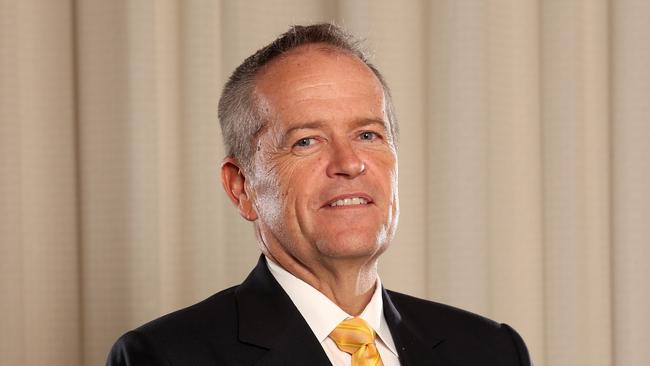
After a decade of political dysfunction, party convulsions, the felling of prime ministers, parliamentary instability and increasing voter disillusionment, Bill Shorten promises a new style of leadership.
In an exclusive interview, an expansive and reflective Shorten spoke about what he has learned after 5½ years as Opposition Leader, how he would lead a Labor government and his policy and political priorities.
“I’ve learnt that the best training ground to become prime minister of Australia is to be leader of the opposition because it tests you, you get examined, you get scrutinised,” he says. “I’ve visited all parts of Australia from the Top End to the bottom, east to west, and everywhere in between just about. I’ve spoken to literally hundreds of thousands of people.
“It’s just the things you see, the things you learn, the mistakes you make. And, to be fair, I’ve been tested. Plenty of people have written me and Labor off, and said it’s an impossible task. But that’s character building. I wouldn’t change a minute of the last 5½ years.
“What I discovered along the way is that you can concentrate on the destination but the journey is part of the lesson, it’s part of the experience. I’ve learnt a lot about myself. I’m an inclusive leader and respectful of my colleagues. These days I listen a lot more than I talk. When I make a decision, I stick to it.”
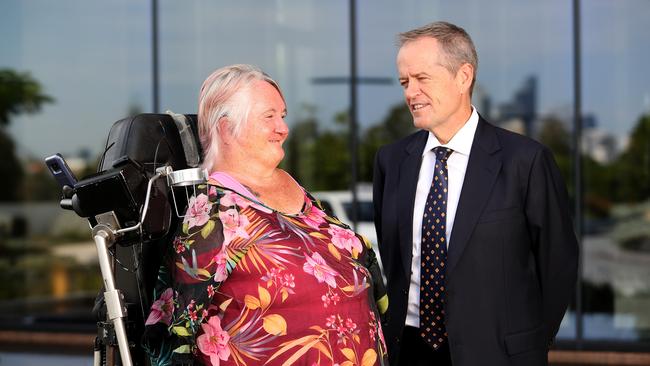
Shorten, who has nursed an ambition to be prime minister since he was a teenager, speaks the language of a transformational leader with a big vision for the country that would see a seismic shift in policy direction. He would lead a more interventionist government with huge spending commitments while promising to deliver larger budget surpluses and pay down debt.
“I’m ambitious for the nation, I’m ambitious for a bigger, brighter future for the country,” he says. “I want us to be a country that is secure in its own skin, confident in the world. I want us to tell a bigger, better story to our kids about who we are and I want to hand on a better deal to our kids than the one we got from our parents — that’s my vision.
“We’ve got a plan for Australia which includes all Australians. We think government should be for all the people, not just vested interests. We want to tackle cuts to hospitals and schools. We want to get wages moving again. We want to see the economy work in the interests of working and middle-class people. We want to take real action on climate change and renewable energy to lower energy prices.”
In seeking to radically transform the policy settings of government, Shorten presents himself as a unifier and a healer who can lift the country out of the swamp of endless, often mindless, political combat and herald a new era of Bob Hawke-style “consensus” politics. “This nation works best when we work together,” he says.
To achieve these lofty goals, Shorten employs the tools of a transactional leader: good at managing his party, a non-interventionist shadow cabinet chair, attentive to the needs of backbenchers, freely doing deals with factions and union leaders to maintain unity. He embraces the description.
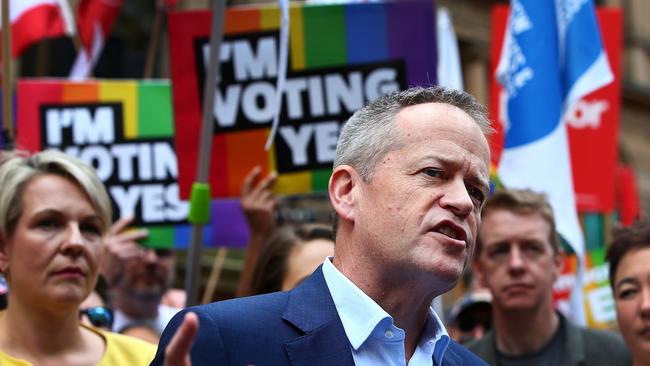
“You can only build trust by keeping your transactions — that is the basis of trust,” he explains. “You say you’re going to do it, then you do it, and people say, ‘Well, I can trust him on that.’ The Labor Party is too big to be run by one person. The country is too big to be run by a messiah or by a dictator or by a one-trick pony.
“If you can’t manage your party, you can’t manage the government and you can’t manage the nation. So I always try to find, in any negotiation, the creation of mutual value. I will always try to understand your interests as well as mine, and then I look to where we can work together to create additional value.”
The transactional framework for leadership also applies externally, Shorten says. He can build coalitions with a diverse range of stakeholder groups on policy. He can manage the unions while pledging to work co-operatively with business.
“My whole track record is to bring people together. I did it at the Australian Workers Union. I did it in my enterprise bargaining. I did it with the National Disability Insurance Scheme. I’ve done it with the Labor Party.”
And Shorten says that with persuasive advocacy he can bring voters with him. He is not concerned about his relative low approval ratings or lagging Scott Morrison as preferred prime minister. Labor insiders concede he carries baggage as a faction leader who wielded the knife against Kevin Rudd and Julia Gillard. They say he will be preferred prime minister when he is the prime minister.
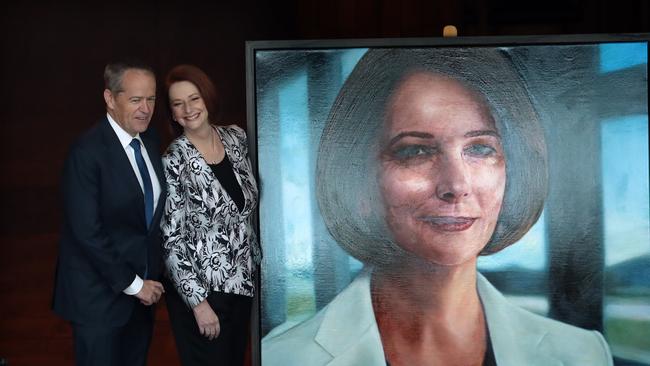
“I’ve argued for lots of change which, when I started off, people didn’t agree with,” Shorten says. “When I started arguing for the National Disability Insurance Scheme, you could have fitted our supporters into a small mini-van. Now Australia supports it. When I started pushing for the banking royal commission, everyone said that was not going to happen.”
This blend of transformational and transactional leadership, applied and tested in opposition, would provide the basis for prime ministerial power and authority. It is audacious in its scope and ambitious in its practical application. It may prove to be fantasy. But the times, Shorten insists, demand a new approach to government. It is about conveying a big vision with bold policies and then delivering on them.
“I’m not just fighting the government, I’m fighting the sense of disillusionment within Australian society that politics can’t change anything, it’s just a toxic swamp. And that’s why I want to put forward positive ideas.”
Those who aspire to be prime minister need to think about how they would run a government. They need to be able to master the art of politics while attending to the business of government. This is the essential recipe for electoral success and longevity in office that has eluded recent prime ministers.
Shorten says he wants to channel the leadership styles of Labor’s past leaders. He waxes lyrical about John Curtin’s “sense of Australian identity”, Ben Chifley’s approach to postwar planning, Gough Whitlam’s “breadth of imagination”, Hawke’s “consensus and connection with the electorate” and Paul Keating’s “forensic advocacy” of policy.
He refers to Morrison as “the current Prime Minister”, a reminder of the Liberal Party’s own leadership churn. Shorten has outlasted Malcolm Turnbull and Tony Abbott, and expects to succeed Morrison. He is “not a hater” and is reluctant to be drawn on their strengths and weaknesses. He says former prime ministers should be called on to play a continuing role in public life but is vague on how.
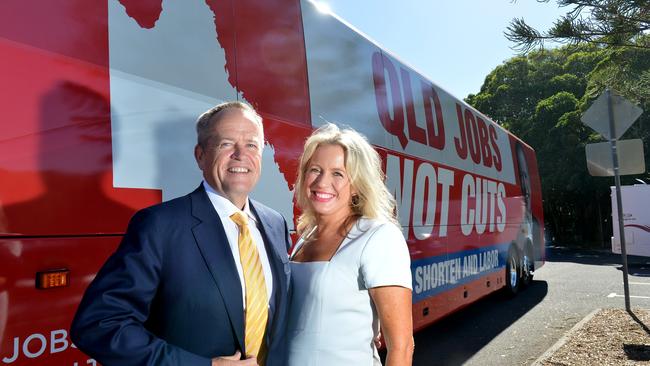
About 400 people squeezed into the Perth Town Hall on Wednesday night to hear from Shorten and ask him questions. There were lots of true believers but many were undecided voters. Shorten was in his element. He began with a standard stump speech that energised the audience and then answered two dozen questions. He was asked about issues such as encryption laws, electric cars, homelessness, refugees, live exports and Islamophobia. He responded to concerns about child custody arrangements, eating disorders, franking credits, financial sector regulation and cannabis.
He shed his suit jacket early, rolled up his sleeves and strolled into the centre aisle to respond in turn. He was less scripted than usual but the audience saw him engaged and interested in their concerns. He made a few jokes. He was not afraid to say he disagreed with a questioner or to correct their false assumptions about Labor policy.
Earlier, Shorten’s red double-decker bus, emblazoned with his photo sandwiched between that of his deputy leader, Tanya Plibersek, and Premier Mark McGowan, arrived at the Steel Blue bootmaking business in Malaga. He donned a yellow vest and toured the factory. He was relaxed and conversed easily with employees and managers.
“Some people hate voting because all you get is another politician,” he said, getting a laugh. “But how you vote affects what you do at work and in your life.”
He followed with a soft sell of Labor’s policies. A pair of mustard-coloured steel-capped boots was presented and he promised to make them part of his wardrobe.
Next was a visit to Trigg Beach to announce funding for SurfingWA. Shorten is not a surfer but he chatted to the snowy-haired kids lined up with their boards and posed for the cameras. “You look like a natural, Bill,” one bystander yelled out. He encouraged the kids to surf in the morning and study in the evening, before he boarded the bus back to Perth.
It has been a long time since an opposition leader went to an election with such a bold set of policies in areas such as workplace relations, climate change, taxation, education and health. It is not quite as extensive as the Liberals’ Fightback manifesto in 1993 or Labor’s It’s Time program in 1972. Nevertheless, Labor is promising substantial change across government.
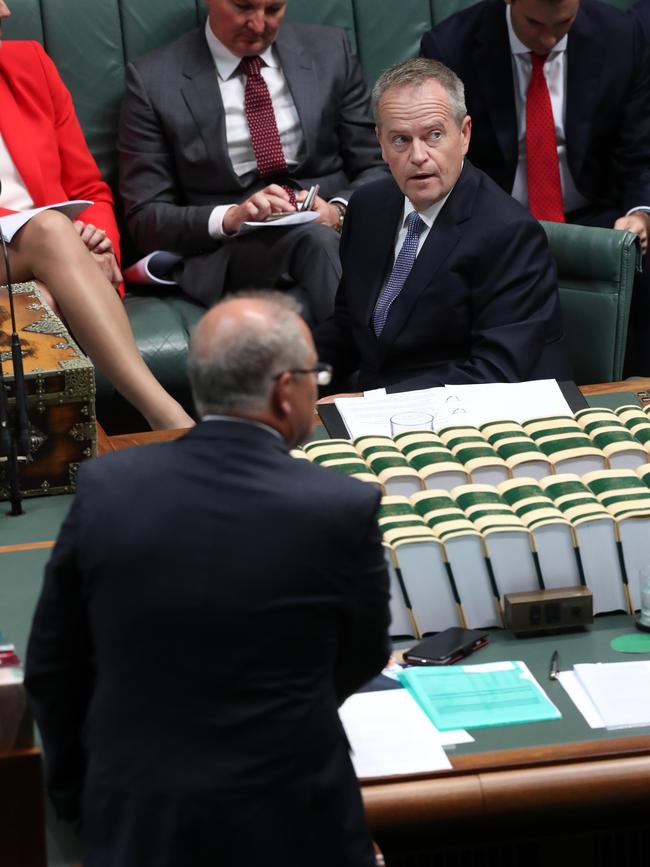
But there are details missing from Labor’s policies. When pushed to explain how Labor’s ambitious climate change goals will be met, or the start date for curbing negative gearing and capital gains tax, or the finer details of its workplace relations policies, including a return to pattern bargaining for some sectors, Shorten bristles.
“Listen, I don’t accept that we are a blank sheet of paper,” he emphasises. “To be fair, though, we’ve outlined more policies in more detail than anyone in a couple of generations.”
He restates Labor’s emissions reduction target of 45 per cent and 50 per cent renewable energy goal by 2030. He reiterates the promise to restore penalty rates, reform work visa arrangements and tackle labour hire and sham contracting. He has been upfront on housing and superannuation tax deductions, and the abolition of franking credits. He vows to “stop people-smugglers” by maintaining offshore processing of refugees and turning back boats.
With Newspoll consistently showing the government headed towards a landslide election defeat, the opposition does not seem worried about calls to explain its policies in more detail. “We will fill the gaps in before the election,” Shorten reassures. “They are legitimate questions and we’ll answer them.”
Shorten has spelled out Labor’s agenda and priorities for government. There will be no Rudd-style 2020 summit. He says he won’t be “getting out the butcher’s paper” and asking “what do we do now?” He adds: “I’ll always be in the business of talking to people but that won’t be a particular mission of mine.”
If elected, he imagines an activist and energetic start to government reminiscent of Franklin D. Roosevelt’s fabled first 100 days. “We are going to be very busy the first week, the first month, the first 100 days of government,” he says. “What I want to do is keep my word and go 100 per cent on the promises I’ve made.”
He will not take up Rudd’s crusade for a royal commission into News Corp, publisher of The Weekend Australian, or seek to regulate newspapers like the Gillard government. “It’s not in my top 100 to-do list,” he says. “The preconditions of the Leveson inquiry I haven’t seen.” Shorten sees no justification for a British-style inquiry into the media in Australia. He is, however, concerned about media concentration and did not support the changes to the cross-media ownership laws. He has promised to restore funding to the ABC and protect its independence. And he has not ruled out regulating Facebook and Twitter to crack down on the promulgation of extremist political ideology.
He rejects the suggestion by business groups that he subscribes to class warfare or the politics of envy. “They’re wrong. I talk to hundreds of businesses. I can’t open the door without business people wanting to come to talk to me.” He has a ready list of business-friendly policies that he runs down: corporate tax cuts, support for apprenticeships, accelerated tax deductions for investment, funding transport infrastructure, backing new mining exploration and providing certainty with a new energy and climate change policy.
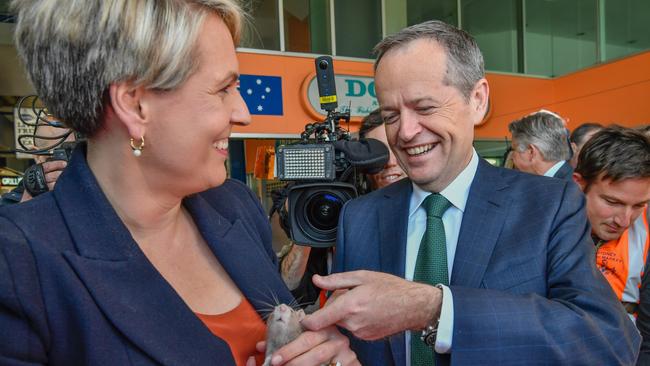
Shorten also promises to forge a co-operative relationship with unions and not be their prisoner. The labour movement, weakened by its dramatic fall in membership, does not have the workplace clout it once did. But it still wields considerable influence in the Labor Party.
“I’ve never hidden the fact that I’m a member of a trade union,” he says. “But I’ll be very clear because the government loves to muddy this water. To borrow from RJ Hawke, I will work with all sectors but I’ll be a handmaiden to none.”
If Shorten does lead the opposition to victory in May, he will be only the fourth Labor leader to do so in the postwar era, after Whitlam, Hawke and Rudd. He has already led the party longer than Rudd, Gillard or Keating. He has been a survivor, against the odds, and is now on the cusp of claiming the prime ministership.
While mainstream centre-left and centre-right parties have been convulsed across the democratic world — internally split, routed by voters or gripped by ideological soul-searching — Shorten says Labor will not suffer the same fate.
“People predicted the demise of the Labor Party not long after it was founded,” he says. “In 2013 we were apparently in an existential crisis driven by internal disunity (but) we didn’t implode (and) we didn’t split. In fact, the government did, even though they are in power. Surely you would have thought that being in opposition would be harder for a party, but I’ve outlasted Abbott, Turnbull, and we’ll see what happens between me and the current fellow.”
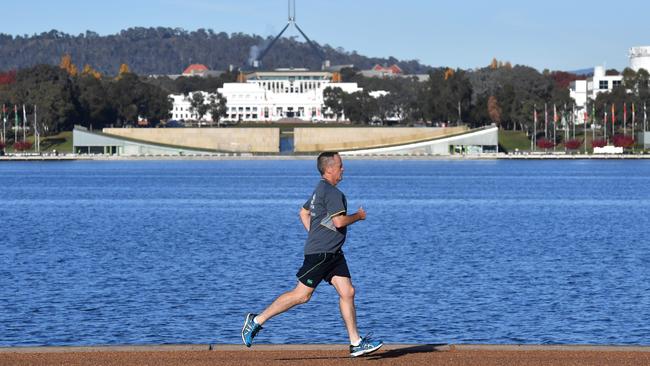
Shorten says his conception of leadership, demonstrated in opposition, will pay a dividend with voters. He has often been underestimated but he has lasted the distance. He has met test after test: by-elections, party conferences and seen off two prime ministers. His leadership has never been more secure. Anthony Albanese, who desperately wants to be Labor leader, has sheathed his sword.
Looking ahead, Shorten is unfazed by the internal challenges that inevitably will come over policy disagreements in cabinet or caucus, a demanding union movement or a party membership with unbridled expectations. He stresses he will deliver on his promises and not retreat from his ambitions. “If I win the election I’ll even have more authority than I do now, not less.” It is a revealing statement.
Shorten is more confident and self-assured, and polished in his pitch to voters, than he was three years ago when he faced his first election as party leader. He has matured. His team is united. He senses that Labor’s policy agenda is broadly in tune with the mood of the electorate. And he is ready, he insists, to govern.
“What I want people to know is that when I say I’m going to do something, I’m going to work as hard as I can to achieve it. I will work as hard as I can on behalf of the Australian people. You can’t always succeed at everything that you do but I want people to know that I will give it a red-hot go and put in 100 per cent.”



To join the conversation, please log in. Don't have an account? Register
Join the conversation, you are commenting as Logout